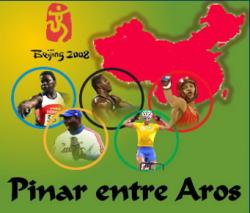Olympic games and Cuban boxers of Pinar del Río.
- Submitted by: admin
- Asia
- Caribbean
- Entertainment
- Events
- international
- personalities
- Pinar del Río
- Sports
- 03 / 05 / 2008

From this article we intend to review the history of the Olympic Games, the most important results and some interesting anecdotes, but always with a glance to the performance of Vueltabajo, perhaps unknown by many people.
The quantitative and qualitative increase of the games has been impressive, I just add that in Athens 1896, 14 countries and 241 athletes gathered, while in the last version held in 2004 also in Athens, 201 National Olympic Committees and 10 thousand 625 athletes participated.
The history of Cuba in the Olympic Games begins in its second edition, celebrated in Paris 1900, and during the whole neocolonial period the participation was thanks to the personal effort of the athletes due to the almost null support of the government.
Under those circumstances Cuba was present in eight Olympiads before the triumph of the Revolution, and the results can be described as good if we analyze the extremely low training conditions of our representatives.
Nevertheless the first titles and medals came early by the great Ramón Fonst and the unknown Manuel Dionisio Díaz in fencing.
Fonst won the epee gold medal and professional epee silver in Paris Olympics. Four years later repeated the epee title and added another in foil, while Manuel Dionisio won the sabre title.
Both of them came from rich families and studied in recognized foreign schools, hence the great results.
All the opposite was Félix Carvajal Soto, also known as "El Andarín", a man who despite not being an exceptional runner, collected the money to go to the Olympics and ended fourth in the marathon, lack of strength due to obliged famine.
After these two editions, Cuba re-appears in the Olympics in Paris 1924
There, at the age of 41, Fonst symbolically led a group of fencing figures integrated by Alfonso López, Eduardo Alonso, Ramiro Mañalich, Salvador Quesada and Osvaldo Miranda; while Enrique Conill, Antonio Saavedra and Francisco Cisneros participated in the yachting competition with a boat called Hatuey.
None passed the qualifying rounds and Cuba was just another country in the list of 44 nations represented there.
In Amsterdam 1928 sprinter José Barrientos was the only representative of Cuba and after a time of 11,10 seconds in the first qualifying hit of the 100 flat meters was eliminated in the second stage.
The politic situation of Cuba at that time together with Machado dictatorship provoked that the 11 athletes registered to participate in Los Angeles 1932 couldn't go to the games.
In 1936, Machado was not the president, but those in the power stated not to have funds to send a delegation to Berlin 1936.
The Second World War stopped the games until 1948, but this part of the history will be told in a next article, since in London Pinar del Río begins its history among the five rings.
(www.guerrillero.co.cu)
The quantitative and qualitative increase of the games has been impressive, I just add that in Athens 1896, 14 countries and 241 athletes gathered, while in the last version held in 2004 also in Athens, 201 National Olympic Committees and 10 thousand 625 athletes participated.
The history of Cuba in the Olympic Games begins in its second edition, celebrated in Paris 1900, and during the whole neocolonial period the participation was thanks to the personal effort of the athletes due to the almost null support of the government.
Under those circumstances Cuba was present in eight Olympiads before the triumph of the Revolution, and the results can be described as good if we analyze the extremely low training conditions of our representatives.
Nevertheless the first titles and medals came early by the great Ramón Fonst and the unknown Manuel Dionisio Díaz in fencing.
Fonst won the epee gold medal and professional epee silver in Paris Olympics. Four years later repeated the epee title and added another in foil, while Manuel Dionisio won the sabre title.
Both of them came from rich families and studied in recognized foreign schools, hence the great results.
All the opposite was Félix Carvajal Soto, also known as "El Andarín", a man who despite not being an exceptional runner, collected the money to go to the Olympics and ended fourth in the marathon, lack of strength due to obliged famine.
After these two editions, Cuba re-appears in the Olympics in Paris 1924
There, at the age of 41, Fonst symbolically led a group of fencing figures integrated by Alfonso López, Eduardo Alonso, Ramiro Mañalich, Salvador Quesada and Osvaldo Miranda; while Enrique Conill, Antonio Saavedra and Francisco Cisneros participated in the yachting competition with a boat called Hatuey.
None passed the qualifying rounds and Cuba was just another country in the list of 44 nations represented there.
In Amsterdam 1928 sprinter José Barrientos was the only representative of Cuba and after a time of 11,10 seconds in the first qualifying hit of the 100 flat meters was eliminated in the second stage.
The politic situation of Cuba at that time together with Machado dictatorship provoked that the 11 athletes registered to participate in Los Angeles 1932 couldn't go to the games.
In 1936, Machado was not the president, but those in the power stated not to have funds to send a delegation to Berlin 1936.
The Second World War stopped the games until 1948, but this part of the history will be told in a next article, since in London Pinar del Río begins its history among the five rings.
(www.guerrillero.co.cu)
Comments